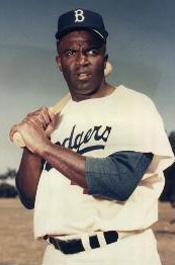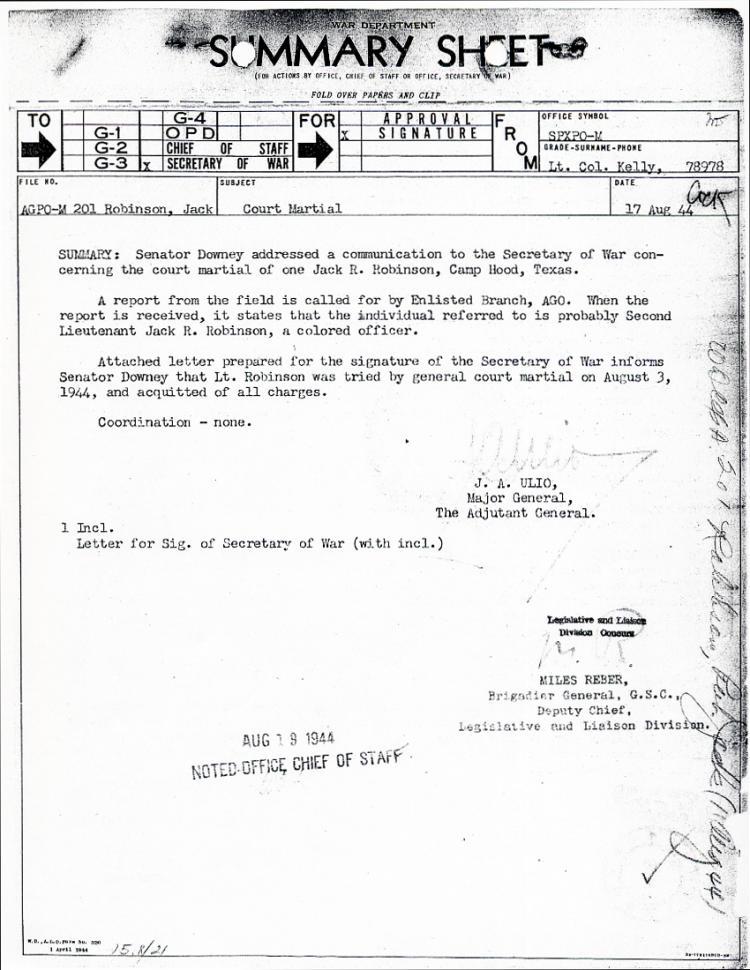Before Brooklyn, Jackie Took A Stand Seated
Lt. Robinson's bus protest detailed in Army records

View Document
APRIL 15---More than a decade before Rosa Parks was arrested by Alabama cops, Lt. Jackie Robinson faced a court-martial for refusing to move to the rear of a city bus traveling near a Texas Army base.
On the day that Major League Baseball remembers Robinson for breaking the sport’s color barrier on April 15, 1947, U.S.  military records offer a reminder that the athlete’s trailblazing was not confined to the baseball diamond.
military records offer a reminder that the athlete’s trailblazing was not confined to the baseball diamond.
Documents from Robinson’s military personnel file detail the Army’s attempt to court-martial him following a July 1944 confrontation on a bus outside Camp Hood, where Robinson was stationed with the 758th Tank Battalion. Prior to his enlistment, Robinson was a star athlete at UCLA and had played semi-pro football in Hawaii.
Robinson, then 25, told Army officials that he had boarded the bus after leaving Camp Hood’s “colored officers club.” After traveling about five blocks, “the bus driver turns around and tells me to move to the rear which I did not do,” Robinson recalled in a sworn statement. Robinson added that the driver warned him that if he did not move, “he will make trouble for me when we get to the bus station.”
When the bus arrived at the station, Robinson said, an aggrieved “white lady” told him that she was going to press charges against him. The bus driver, added Robinson, then told other passengers that, “this nigger is making trouble.” In response, “I told the bus driver to stop fuckin with me,” stated Robinson.
Robinson was arrested by military police officers at the bus station. During a subsequent investigation, Army officials interviewed various witnesses about the bus incident.
Driver Milton Reneger said that he politely asked Robinson to move to the rear of the bus since he was expecting to pick up “a load” of women who likely would not want to sit with a black man. Referring to the female passengers, Reneger said, “I was sure they wouldn’t want to ride mixed up like that.” When asked to move a second time, Robinson, Reneger claimed, cursed him and said, “I’m not going to move a God damned bit.”
Reneger told investigators that a female passenger--who worked at an Army trading post--remarked, “I don’t mind waiting on them all day, but when I get on the bus at night to go home, I’m not about to ride all mixed up with them.”
Elizabeth Pointevint, the passenger referred to by Reneger, told of offering to serve as a witness against Robinson. In a statement, Pointevint said Robinson told her, “Listen here you damned old woman, you have nothing to say about what’s going on. I didn’t want to get into this, they drafted me into this, and my money is just as good as a white man’s.” Pointevint, who  did not recall anyone calling Robinson a nigger, said that Robinson was “very hateful to the bus driver, and the bus driver was very polite to him.”
did not recall anyone calling Robinson a nigger, said that Robinson was “very hateful to the bus driver, and the bus driver was very polite to him.”
Ruby Johnson, a friend of Pointevint, said that Robinson refused Reneger’s request to move to the back of the bus, and told the driver, “No, I’m going to sit here, I’m not going to move to the back of the bus.” Robinson, Johnson claimed, said this “in a very forceful voice.”
Private Ben Mucklerath, who was at the station when Reneger pulled in, claimed that Robinson directed “obscene language” at a “white lady” who had departed the bus. Mucklerath quoted Robinson telling a military cop, “There’s no God-damned son-of-a-bitch going to tell me where to sit.” Women, children, and soldiers present were subjected to Robinson’s “coarse, rough and harsh tone of voice,” said Mucklerath, who added that this conduct was “very unbecoming to an officer and a gentleman.”
Edward Hamilton, an Army captain, said that Robinson was “very disrespectful and discourteous” when giving his official statement about the bus incident.
In August 1944, Robinson faced a court-martial trial for two alleged violations stemming from his behavior during Army interviews following the bus incident. Specifically, Robinson was accused of disrespecting a superior officer and disobeying a lawful command. He was not charged in connection with what occurred on the bus.
At trial, Robinson testified about being called a nigger by a fellow soldier on the night of the bus incident. “I do not consider myself a nigger at all, I am a negro, but not a nigger,” he said.
Robinson was subsequently found not guilty on both counts. Three months after that acquittal, the future Brooklyn Dodger was honorably discharged from the Army. (2 pages)





